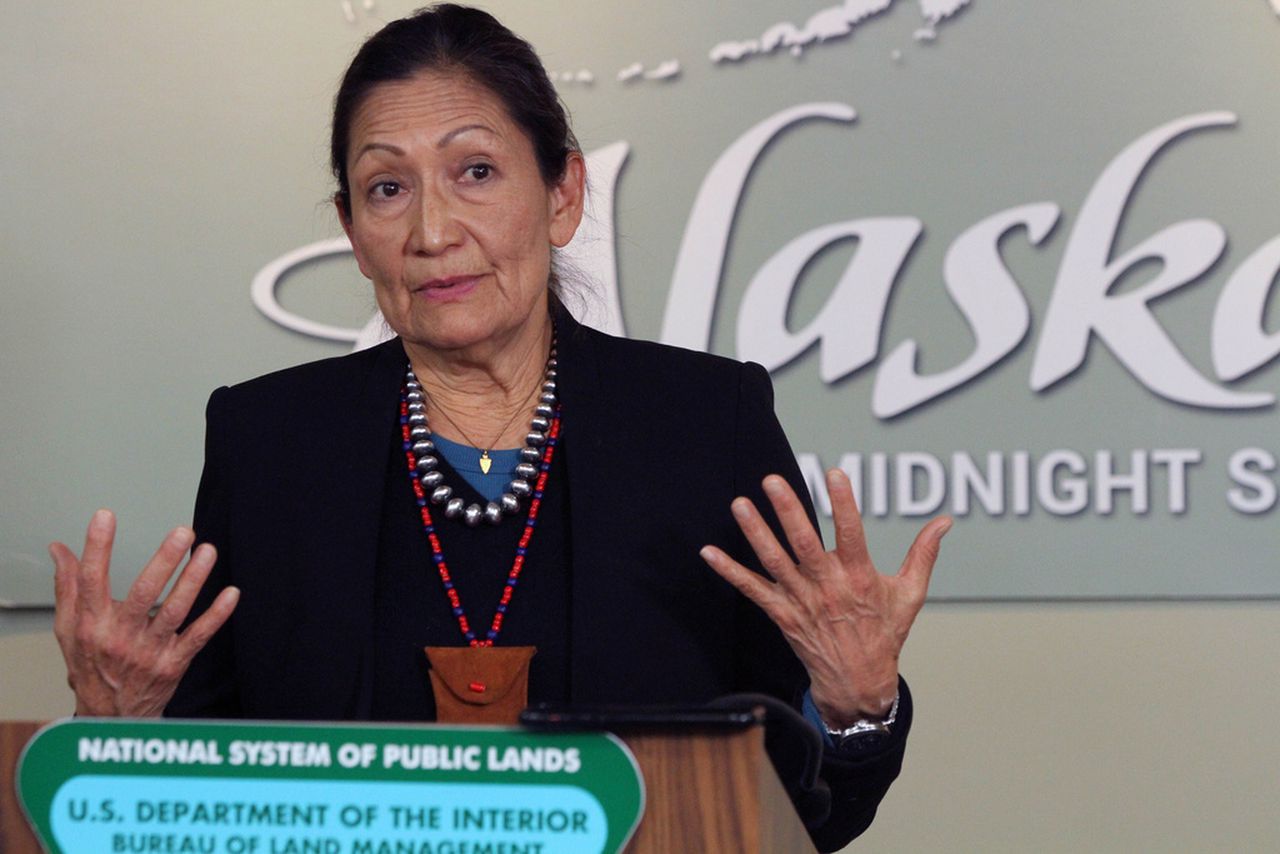Haaland wades into thorny land exchange fight in Alaska
JUNEAU, Alaska (AP) — A day after the Biden administration approved a major Alaska oil project, U.S. Interior Secretary Deb Haaland waded into another thorny battle in the state — a long-simmering dispute over building a road through a national wildlife refuge to provide health care access for a remote, and largely Indigenous, community.
Building the road would involve a contentious land exchange, and after Haaland visited King Cove a year ago, she told reporters she was “in a learning process” regarding the issue. On Tuesday, she withdrew a 2019 agreement finalized during the Trump administration that has been the subject of ongoing litigation, citing a lack of public participation and environmental review. She also expressed concerns about impacts on subsistence uses and wildlife.
“I believe deeply in the need to protect our lands and waters and honor our obligations to Tribal Nations. Respecting Tribal sovereignty means ensuring that we are listening – really listening – to Tribal communities,” Haaland said in a statement, saying she is a “lifelong conservationist.”
She said she has instructed her team to begin a process to review prior land exchange proposals, with consultation, conservation and subsistence goals in mind.
The road through Izembek National Wildlife Refuge has been a priority for Alaska’s Republican U.S. senators, Lisa Murkowski and Dan Sullivan, both of whom crossed party lines to confirm Haaland’s nomination as Interior Secretary and were vocal in seeking approval of the Willow oil project. Sullivan denounced Haaland’s decision Tuesday as a delay tactic.
The oil project in the National Petroleum Reserve-Alaska is the largest in Alaska in years and angered environmentalists who see it as flying in the face of President Joe Biden’s climate goals. Trustees for Alaska, which is representing conservation groups that challenged the Trump-era land exchange, filed a lawsuit Tuesday challenging approval of Willow.
In a video Monday, Haaland referred to the Willow project as a “difficult and complex issue” involving leases issued by prior administrations.
“As a result, we had limited decision space, but we focused on how to reduce the project’s footprint and minimize its impacts to people and to wildlife,” she said.
The community of King Cove has long advocated for a land connection through Izembek National Wildlife Refuge to Cold Bay, about 18 miles (29 kilometers) away. Cold Bay has an all-weather airport, and residents — supported by members of Alaska’s congressional delegation and governor — have long argued this is a health and safety matter.
In a memo dated Tuesday regarding the land exchange, Haaland said her decision “does not foreclose further consideration of a land exchange to address the community’s concerns.”
Debate over a land exchange spans presidential administrations and has been the source of legal sparring. The refuge contains internationally recognized habitat for migrating waterfowl.
In 2013, during the Obama administration, Interior Department officials, including then-Secretary Sally Jewell, declined a land exchange, citing an environmental review that showed construction of a road would lead to “significant degradation of irreplaceable ecological resources.”
Efforts to advance an exchange during the Trump administration faced legal challenges and the matter has been tied up in federal appeals since. Most recently, the 9th U.S. Circuit Court of Appeals heard arguments late last year; Haaland’s memo was filed with that court Tuesday.
Bridget Psarianos, a senior staff attorney with Trustees for Alaska involved in the land exchange litigation, said she was glad to see the land exchange withdrawn but said “questions remain about Interior’s next steps.”
She called stopping the land swap that would allow the road “a good first step” but said more was required to fully protect the refuge.
A spokesperson with the Aleutians East Borough, Laura Tanis, said Haaland spoke Tuesday with borough, tribal, city and village corporation officials.
Della Trumble, CEO of the King Cove Corp., an Alaska Native village corporation, said she had no comment on Haaland’s move.
— By BECKY BOHRER Associated Press
